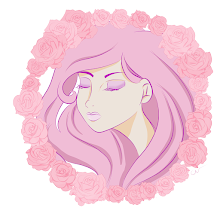Good morning!
For anyone who doesn't know, I run a small bookkeeping business called Silver Anchor Bookkeeping out of Victoria, BC. I've been running my company for a bit over a year and a half now, and it's doing fairly well. I'm pretty sure I have the best clients in the world, and there's a great feeling to being self-employed.
There is also a lot of extra work that goes into being a freelance *anything*, as I'm sure every small business owner will attest.
This month, I launched my art shop, Chris Vivier Art and Comics as well. I didn't think much of it. This might sound ridiculous (or relatable, depending on what you do for a living) but I didn't think anyone would actually buy anything. I had some postcards and stickers printed, and posted my commission prices.
I haven't been drowning in my success or anything, but I was definitely wrong about nobody wanting my work. This has been a great feeling, and I'm really surprised and grateful for all of this! But now it means it's time to do this right. I thought it might be useful for others to know what steps are involved in starting a small business account - especially for artists and illustrators who might not be doing any of these things. (I live in BC, so this info will be specific to there.)
If you run a small business, it's really important to keep track of all of your earnings. When you do your taxes at the end of the year, you will be asked a multitude of seemingly random questions (How big is your office space? How much did you spend on bank fees? How much did you spend on office supplies?) and if you did not keep track of this, these are charges you're not claiming. Don't do this! Keep your money. You worked hard for it.
Step 1: Get a business number.
This is super easy. Go to the CRA website and apply online. It doesn't take long at all, and it's free.
Step 2: Register with your local professional organization (if applicable)
I did this for my bookkeeping business, but it wasn't relevant for my art company.
Step 3: Tax Accounts
This can be quite confusing if you aren't sure what you're doing. There's a lot of information online.
For me, I don't need to register for these for my art account, because my earnings are quite low. I would recommend reading up on the GST and PST rules (or HST, if you aren't in BC) for your province regardless.
For my bookkeeping business, I got out a GST number fairly early on because I knew I would be making more the minimum within the first year.
Step 4: Register your name
This can take a while, sometimes a few weeks. Do it early. If you are just running your account under your own name, I would still register. It costs around $30.00 to do this. You'll need this or a business licence for your area if you want to open a bank account in BC. (I did not get out a business licence for my arts company as all my work is done online.)
Step 5: Open a bank account
This is the easiest way to keep track of your work expenses and income without mixing it into your main bank account. If you're worried about monthly fees, I'd recommend going to a local credit union. (I use Coast Capital). Usually their fees are very low or non-existent.
This is also a good time to link your Paypal or merchant accounts to your new bank account! This will open up the possibility of printing statements for your bookkeeper at the end of the month. (Or just keeping things clean, if you want to do it yourself.)
If you are doing books on your own, I use Wave Accounting. I know a lot of other sites exist that let you keep track of your own finances, but Wave is my favourite because the costs are very low and they allow you to email receipts to yourself. (And if you need help, I'm a Wave Apps pro! I can always help you set up your accounts there if you need it, and my rates are very reasonable.) A lot of people swear by Freshbooks as well, and I know Quickbooks Online is absolutely amazing.
If you are in the market for a bookkeeper, or need help setting up your small business accounts, please email me at chpvivier@gmail.com. 💛
This is for informational purposes only, and should not be considered financial advice. If you require financial advice, please contact an accountant in your region who is an expert in the fields listed.
Stress-Free Travel Set
4 years ago
